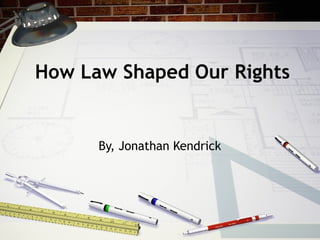
Cbl landmark cases
- 1. How Law Shaped Our Rights By, Jonathan Kendrick
- 2. Mapp v Ohio• Overview of case There was a suspicion that Dollree Mapp was hiding someone who was suspected to be apart of a bombing in her house. The police asked to come in but she told them not until they had a search warrant. After watching her house for a couple of hours they forced their way in. When she asked for a search warrant they held a piece of paper in her face. After searching her house the found a “trunk” containing pornography. The police arrested her for “possesion of obscene materials,” an Ohio law. • Plaintiff Arguments Dollree Mapp was in possession of illegal pornographic material at the time of her arrest.
- 3. Mapp v Ohio• Defenses Arguments The police “violated her rights”. She was not shown asearch warrant upon the entry of the police into her house. Violating the 4th amendment against unreasonable search and seizures.
- 4. Mapp v Ohio• Decision The court ruled 5 to 3 in favor of Mapp. They stated that since the police had not clearly presented Dollree Mapp with a search warrant, all the evidense that the police had found during the search of her home was illegally obtained making it unusable. Also the police had violated the 4th amendment of unreasonable searches and seizures.
- 5. Marbury v Madison • Overview of Case Before John Adams left office he appointed 58 people from his political party to be in congress. It was Secretary of state, John Marshall’s, job to deliver all the letters to the people John Adams wanted in congress. Marshall mailed most of the letters except for 17 of them. He told the new secretary of state, James Madison, to mail the rest of the letters. New president, Thomas Jefferson, told him to not to mail them. William Marbury who was one of the men who didn’t receive the letter appointing him to a congress position sued James Madison. The judge in this case would end up being John Marshall. • Plaintiff Arguments Marbury said that the position belonged to him and that the court had the authority to appoint him through a writ of mandamus which is a court order that make a man do or not do a specific action.
- 6. Marbury v Madison • Defense’s Arguments James Madison did not not give the court a cause for why he did not give all the commissions to the 17 men. Therefore the court could not issue a writ of mandamus. James Madison and mainly Thomas Jefferson basically out smarted the legal system.
- 7. Marbury v Madison • Decision Everyone in the court voted that Madison did not have to deliver the commission to Marbury. The court came to this decision because if they did tell Madison to deliver the commission to William Marbury and he refused, then their was nothing in the court’s power to tell him other wise. This would then make the court look weak so they decided to vote in favor of Madison. The Judiciary Act of 1789 and the constitution were going against each other so John Marshall said that the constiution was the supreme law of the land and that’s what influenced his decision.
- 8. Roe v Wade • Overview of Case Roe was pregnant and wanted to have an abortion but, in Texas it was a felony to get an abortion. It was only legal if the pregnancy was a danger to the mother’s life. So Roe tried to sue the district attorney of Dallas county, Wade. • Plaintiff Arguments Roe argued that Texas abortion law conflicted with the right to privacy in the 1st, 4th, 5th, 9th and 14th amendments.
- 9. Roe v Wade • Defense’s Arguments Texas argued that the life of a child was more important the the privacy of the mother. They also argued that cases before where the right of privacy was voted for were not absolute.
- 10. Roe v Wade • Decision The supreme court voted in favor of Wade, 7-2. They said that if a woman wanted to have an abortion then they are protected by their right of privacy. They said the 14th amendment protected the right of privacy.
- 11. Conclusion • Mapp v Ohio The police did not present Mapp with clear search warrant, making all the evidence they found illegally obtained and unusable. They also disobeyed the fourth amendment against unreasonable search and seizures. • Marbury v Madison The Judiciary Act of 1789 and the constitution were in conflict with each other so the court ruled in favor of the constitution, the supreme law of the land. • Roe v Wade The 14th amendment states that “no person was allowed to be deprived of life, liberty,or property without "due process of law.” So Roe was later allowed to have an abortion because if she was not allowed then her right to privacy would have been violated, which would violate the 14th amendment.